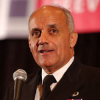Richard Carmona

Richard Carmona
Richard Henry Carmona is an American physician, nurse, police officer, public health administrator, and politician. He was a vice admiral in the Public Health Service Commissioned Corps and served as the seventeenth Surgeon General of the United States. Appointed by President George W. Bush in 2002, Carmona left office at the end of July 2006 upon the expiration of his term. After leaving office, Carmona was highly critical of the Bush administration for suppressing scientific findings which conflicted with the...
NationalityAmerican
ProfessionPublic Servant
Date of Birth22 November 1949
CountryUnited States of America
The overarching issue, really, is our surgeon general should be able to communicate transparently and honestly with the American public on all issues.
As 17th U.S. Surgeon General, I was privileged to serve as the nation's doctor. I focused much of my time on promoting proven programs and individual steps that lead to good health.
I am not a Hispanic candidate. I am an American candidate who happens to be of Hispanic heritage, who understands the culture, who has worked the border and has a unique understanding of those issues. But rest assured my job is to represent all Americans as a U.S. senator.
I've had opportunities before to run for office - the Republicans recruited me when I was surgeon general, to run for Congress, to run against Gov. Napolitano. But I didn't feel it was my calling... I felt, 'Well, I'm flattered, but I really would rather stay and be the doctor of the nation and stay as surgeon general.'
We need stem-cell research, no question about it. It is absolutely crucial for moving our medical science forward. We are trying to harness an untapped source of energy that can provide cures and possibly even prevent disease and suffering.
I got into medical school at the University of California in San Francisco and did well. A lot of smart kids in medical school, and believe me, I wasn't not nearly the smartest one, but I was the most focused and the happiest kid in medical school. In 1979, I graduated as the valedictorian and was honored with the Gold Cane Award.
The reason I’m disabled is because I have wounds and injuries that I got while on active duty … from parachute jumping to combat to gunshot wounds, all that stuff,
In honor of Surgeon General Koop's legacy, we should ensure that the position of surgeon general is protected from political interference, funded appropriately and nominated from the ranks of career public health professionals who merit consideration, as is done in the other uniformed services.
As a father, physician and nurse, I have a special place in my heart for children, and I know the brief window of opportunity we have to teach them simple lessons that can lead to a lifetime of good health.
Trying to block women from getting access to contraception or defunding Planned Parenthood is completely nonsensical from a policy standpoint.
I see good ideas on the Republican side as well as the Democratic side. You have to return civility and statesmanship to governance. If you don't do that, it doesn't matter what portfolio of issue you're pushing, nothing is going to get done.
When I was 5, 6 - so you know, memories aren't that great - I remember coming home and I remember seeing all of our belongings on the street and a Salvation Army truck picking them up. We got taken to a shelter. And then we moved around a lot, finding places to stay.
Whenever I've had to make a major decision as a doctor, cop or for a company I've worked for, I ask myself: What is the value proposition here? Will my decision bring added value to the population I have the privilege to serve?
We still have several thousand children a day who start smoking every single day in this country and half of them will go on to be chronic smokers.